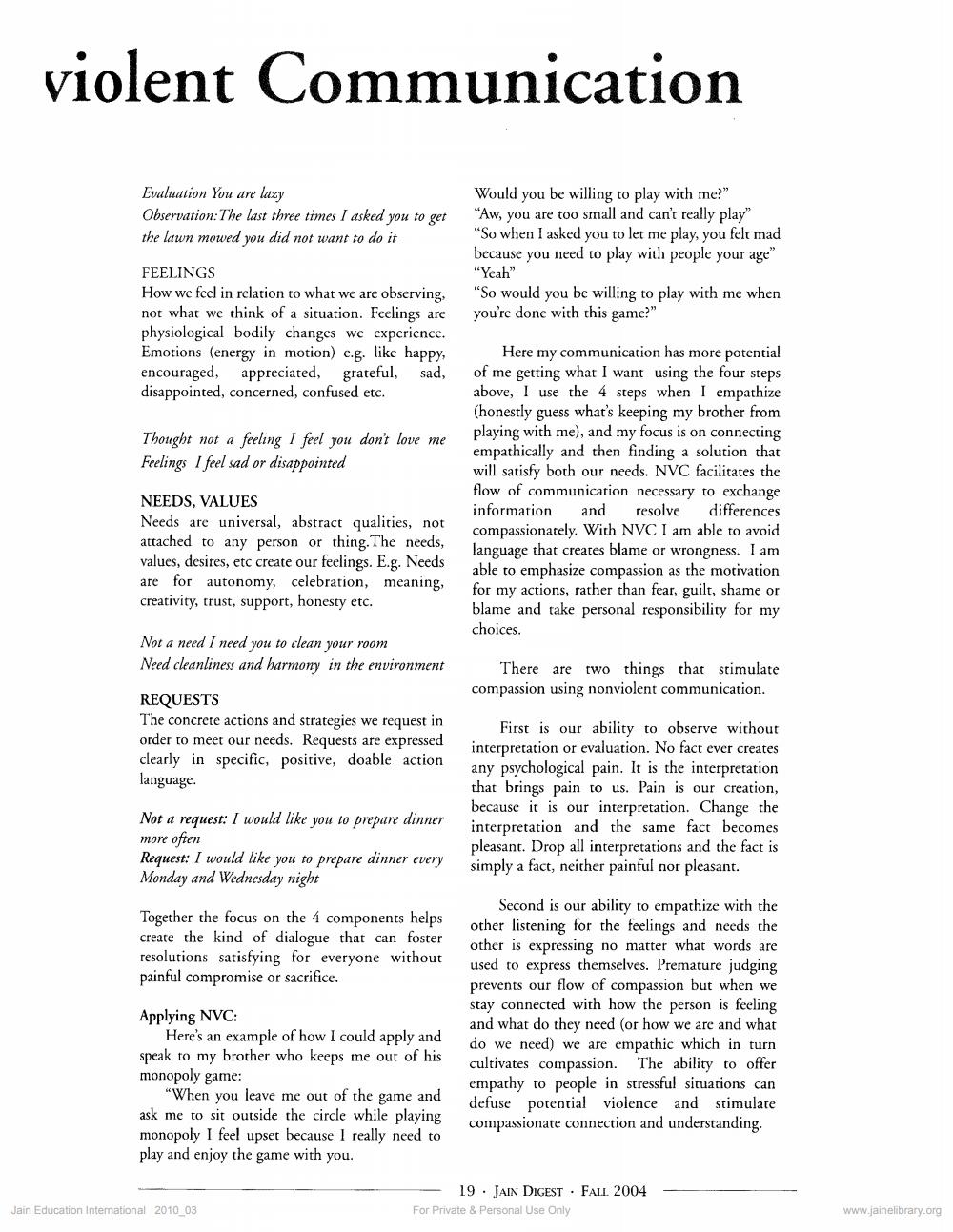________________
violent Communication
Would you be willing to play with me?" "Aw, you are too small and can't really play" "So when I asked you to let me play, you felt mad because you need to play with people your age" "Yeah"
Evaluation You are lazy
Observation: The last three times I asked you to get the lawn mowed you did not want to do it
FEELINGS
How we feel in relation to what we are observing, not what we think of a situation. Feelings are physiological bodily changes we experience. Emotions (energy in motion) e.g. like happy, encouraged, appreciated, grateful, sad. disappointed, concerned, confused etc.
Thought not a feeling I feel you don't love me Feelings I feel sad or disappointed
NEEDS, VALUES
Needs are universal, abstract qualities, not attached to any person or thing. The needs, values, desires, etc create our feelings. E.g. Needs are for autonomy, celebration, meaning, creativity, trust, support, honesty etc.
Not a need I need you to clean your room Need cleanliness and harmony in the environment
REQUESTS
The concrete actions and strategies we request in order to meet our needs. Requests are expressed clearly in specific, positive, doable action. language.
Not a request: I would like you to prepare dinner more often
Request: I would like you to prepare dinner every Monday and Wednesday night
Together the focus on the 4 components helps create the kind of dialogue that can foster resolutions satisfying for everyone without painful compromise or sacrifice.
Applying NVC:
Here's an example of how I could apply and speak to my brother who keeps me out of his monopoly game:
"When you leave me out of the game and ask me to sit outside the circle while playing monopoly I feel upset because I really need to play and enjoy the game with you.
Jain Education International 2010_03
"So would you be willing to play with me when you're done with this game?"
Here my communication has more potential of me getting what I want using the four steps above, I use the 4 steps when I empathize (honestly guess what's keeping my brother from playing with me), and my focus is on connecting empathically and then finding a solution that will satisfy both our needs. NVC facilitates the flow of communication necessary to exchange information and resolve differences compassionately. With NVC I am able to avoid language that creates blame or wrongness. I am able to emphasize compassion as the motivation for my actions, rather than fear, guilt, shame or blame and take personal responsibility for my
choices.
There are two things that stimulate compassion using nonviolent communication.
First is our ability to observe without interpretation or evaluation. No fact ever creates any psychological pain. It is the interpretation that brings pain to us. Pain is our creation, because it is our interpretation. Change the interpretation and the same fact becomes pleasant. Drop all interpretations and the fact is simply a fact, neither painful nor pleasant.
Second is our ability to empathize with the other listening for the feelings and needs the other is expressing no matter what words are used to express themselves. Premature judging prevents our flow of compassion but when we stay connected with how the person is feeling and what do they need (or how we are and what do we need) we are empathic which in turn cultivates compassion. The ability to offer empathy to people in stressful situations can defuse potential violence and stimulate compassionate connection and understanding.
19 JAIN DIGEST FALL 2004 For Private & Personal Use Only
www.jainelibrary.org




